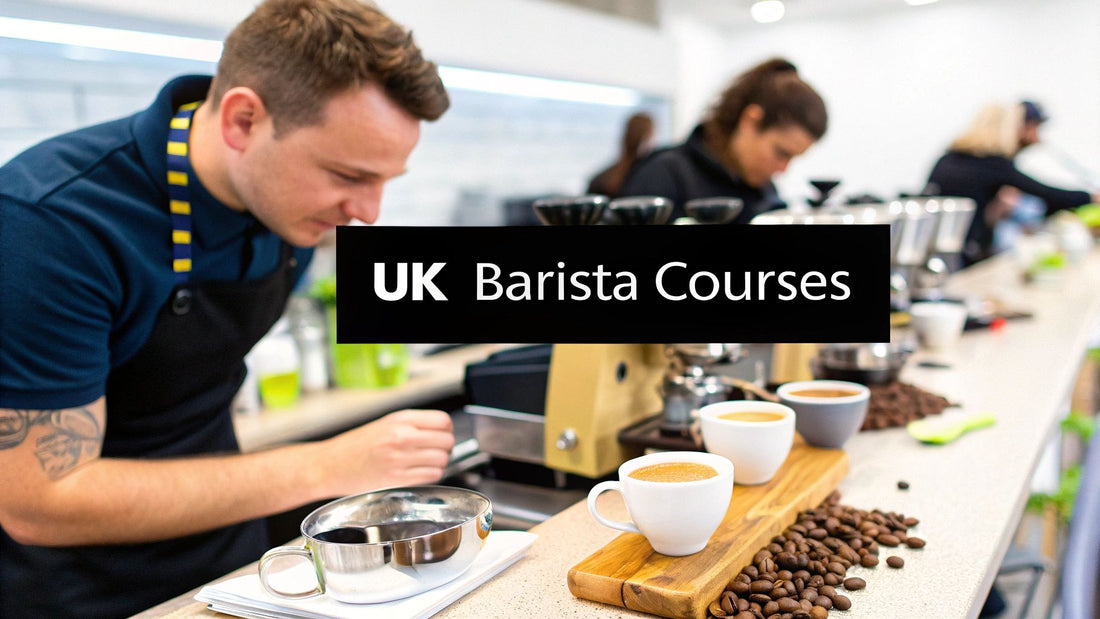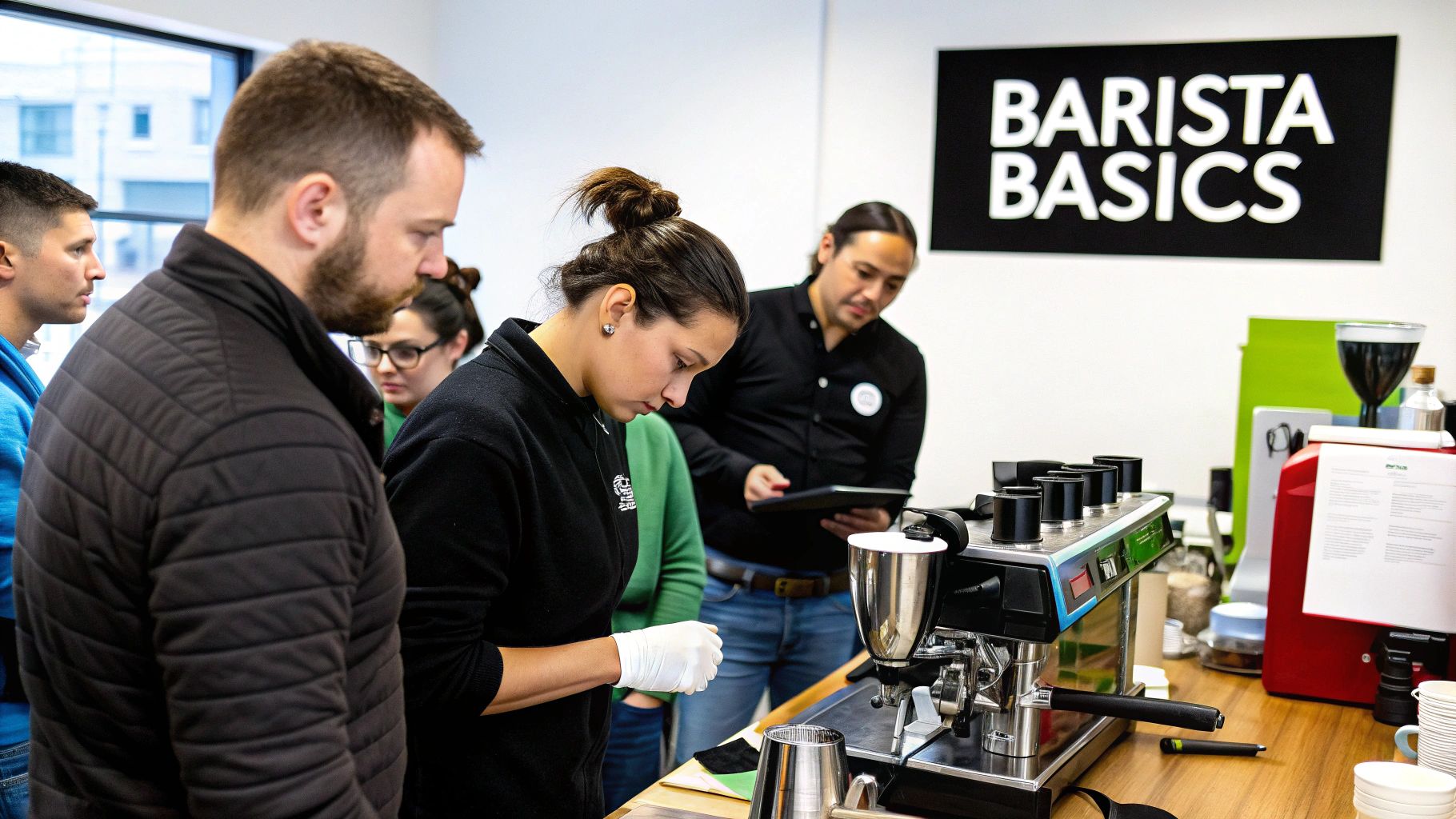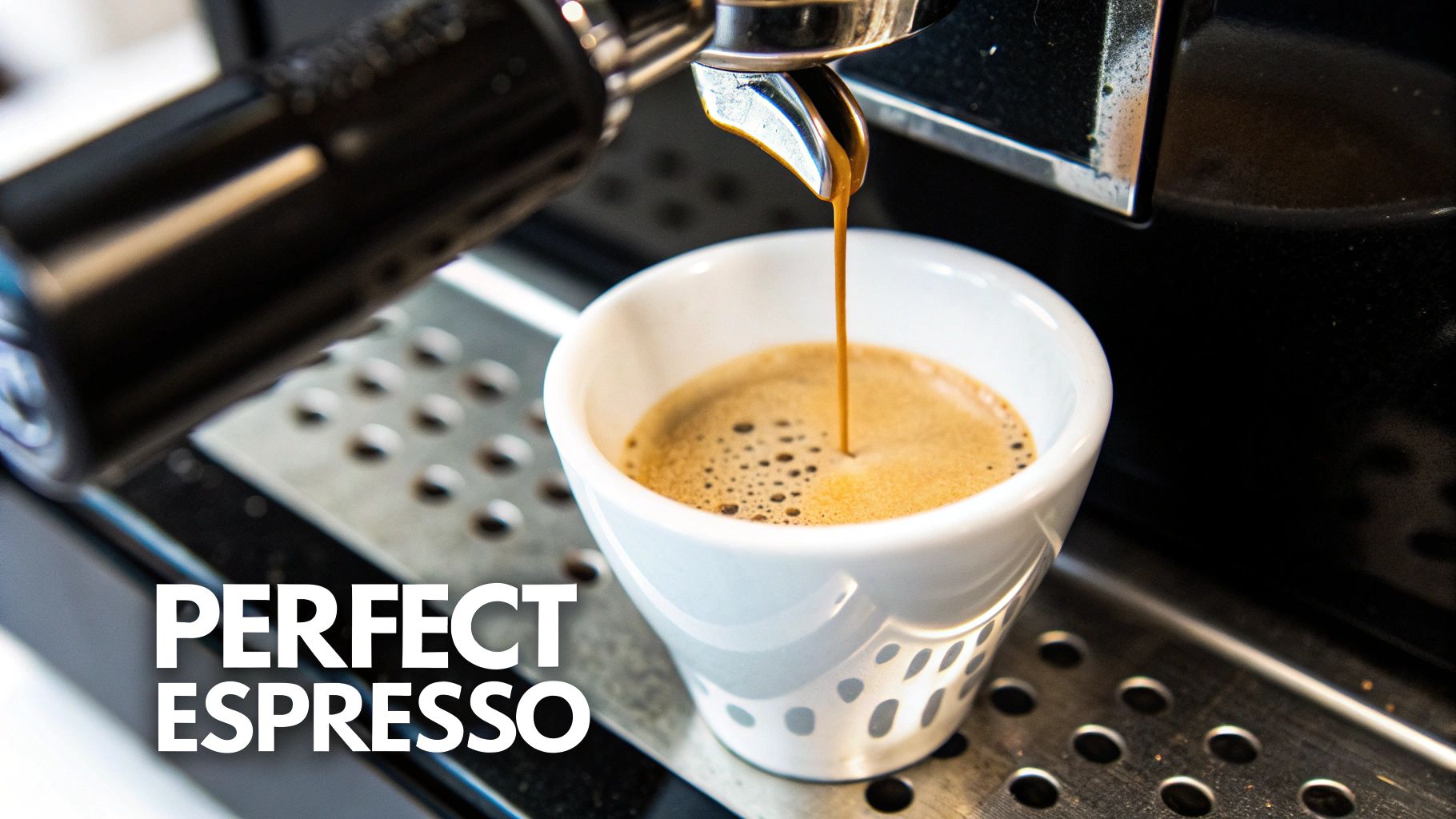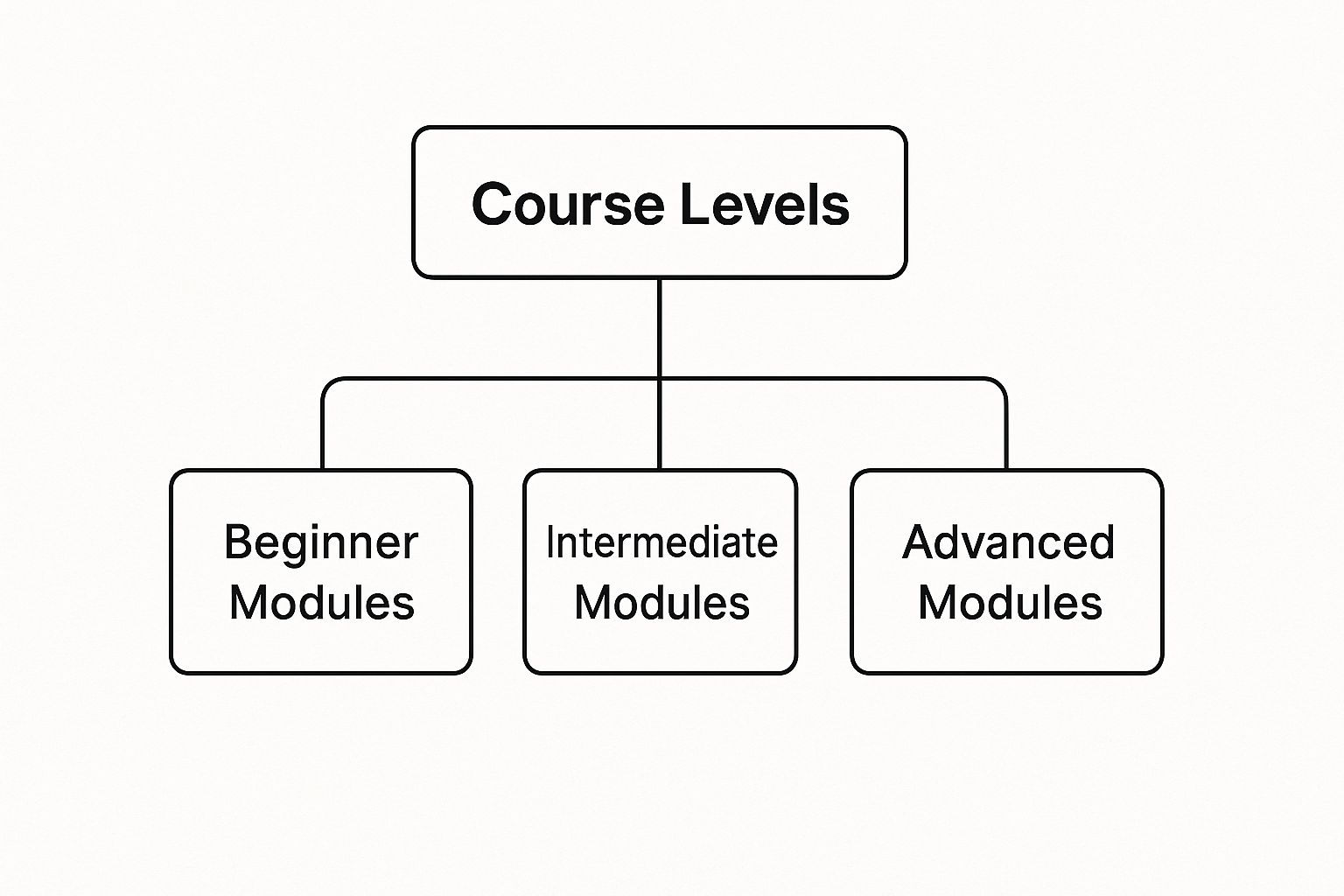
Your Guide to UK Barista Training Courses
Share
Becoming a truly skilled barista is about so much more than just knowing how to use an espresso machine; it’s about mastering a craft. The best barista training courses give you that crucial foundation, turning a passion for coffee into a professional skill set that opens doors in the UK's brilliant speciality coffee scene.
Embarking on Your Speciality Coffee Journey

The UK’s love for exceptional coffee has created a huge demand for genuine coffee professionals. The role has evolved far beyond just pressing buttons on a machine; today's barista is a unique blend of artist, scientist, and hospitality expert, all rolled into one. This is where proper training stops being a "nice-to-have" and becomes essential for anyone serious about a career in the UK market.
Think of it like being a top chef. They don’t just blindly follow recipes; they understand the chemistry of flavours, how heat transforms ingredients, and how to present a dish that looks as good as it tastes. A professional barista applies that exact same level of detail and knowledge to coffee, mastering the science behind extraction, the art of texturing milk, and the warmth of genuine customer service.
Why Formal Training Matters
In such a competitive market, a structured learning path is what really sets you apart. Trying to learn everything on the job can be a slow process, and it often means picking up bad habits or missing the fundamental principles that are key to making consistently great coffee. A dedicated course gives you a controlled space to build a strong, correct foundation from the ground up.
A great barista training course does more than just teach you skills—it inspires you to see the true potential of the craft. It gives you a clear roadmap from the basics to advanced techniques, empowering you to chase your coffee ambitions with confidence.
This guide is designed to be that roadmap for you. We’ll walk through everything you need to know to get started, covering:
- The core skills you'll master in a foundational course.
- How to understand the different course types, from beginner to advanced.
- The real-world career benefits of investing in your coffee education in the UK.
- How to pick the perfect training partner to match your goals.
The Value of Skill in the UK Coffee Market
Investing in your own professional development has a direct impact on your career path and how much you can earn. In the UK, barista salaries vary widely based on experience and qualifications, and proper training is a major factor in moving up the ladder. According to recent UK job market analysis, the average hourly rate sits around £10.05, while experienced professionals can earn up to £22,391 per year.
Structured barista training courses give you the expertise to handle complex equipment and deliver top-tier service, which makes you far more employable and boosts your earning potential. You can find out more about what to expect from a barista salary and career progression in the UK.
What to Expect from Foundational Barista Training

Stepping into your first barista training course is exciting, but it can also feel a little intimidating. You’re not just learning to pour a drink; you’re being initiated into a craft, learning a new language spoken through grinders, steam wands, and the perfect espresso shot. Foundational barista training courses are designed to pull back the curtain on this world, giving you the core skills to work with confidence and precision in any UK café.
Think of it like building a house. You have to start with solid foundations—understanding the coffee itself—before you can dream of adding the intricate details. Each skill you pick up is another brick, carefully layered to create a solid base of knowledge. This hands-on approach is what makes these courses so effective, taking you from theory to real-world practice in just a few hours.
The Core Building Blocks of a Barista
Any good foundational course will break down the complex art of coffee making into digestible, practical modules. The aim is to build muscle memory while also teaching you the ‘why’ behind every single step.
You’ll almost always start with the heart of any coffee bar: the espresso machine and grinder. You'll get to know the equipment intimately, learning not just what the buttons do, but how each tiny adjustment influences the final taste in the cup. From there, you'll dive into the techniques that form the bedrock of a barista's skill set.
These essential skills usually include:
- Dosing: Learning to measure the precise amount of ground coffee needed for a balanced shot.
- Distribution & Tamping: Mastering the techniques for a flat, even bed of coffee grounds—absolutely critical for consistent extraction.
- Espresso Extraction: Pulling your first shots, learning to spot the visual cues of a perfect espresso, and troubleshooting when things don't go to plan.
- Milk Texturing: Understanding the science behind steaming milk to create that silky microfoam essential for lattes and cappuccinos.
The most crucial lesson you'll learn is that consistency is king. A great barista can make a fantastic coffee time and time again, and that ability is born from mastering these fundamental building blocks.
In the UK, these foundational skills are the essential starting point for anyone serious about a career in coffee. A typical introductory course covers coffee origins, machine basics, dosing, tamping, and steaming milk for classic drinks, along with vital health and safety standards. This widespread training helps raise the bar for quality across the country. You can learn more about how a foundation barista training course is structured on extractcoffee.co.uk.
Beyond the Brew Itself
But being a professional barista isn’t just about what goes into the cup. A huge part of any reputable course focuses on the routines that keep a coffee bar running smoothly and safely. These are the skills that employers in the UK coffee scene truly value.
You’ll learn the daily and weekly cleaning protocols for the espresso machine and grinders, which ensures both hygiene and the longevity of the equipment. Health and safety procedures are another vital component, covering everything from handling hot liquids to keeping your workspace clean and organised. These elements are non-negotiable in a professional setting and form the backbone of a barista's daily duties, giving you the confidence to step behind any coffee bar and operate like a true professional.
Navigating Different Types of Barista Courses
Deciding to invest in your coffee education is a brilliant first step. But you’ll quickly discover that not all barista training courses are created equal. The UK’s speciality coffee scene is buzzing with different training options, each tailored to specific skill levels and career goals. Figuring out these differences is crucial for mapping out your learning path and making sure you sign up for a programme that actually fits what you need.
It’s a bit like learning to drive. You wouldn't attempt to join the motorway on your first lesson; you’d start by mastering clutch control in a quiet car park. Barista training is the same kind of progressive journey, where each level builds on the skills you’ve just learned. Whether you’re a complete beginner dreaming of your first café job or a seasoned pro looking to specialise, there’s a course designed for you.
This diagram shows how a typical training path works, starting with the basics and moving up to more advanced skills.

As you can see, a solid foundation is everything. You need to nail the fundamentals before you can tackle the more intricate techniques.
Foundational to Advanced Progression
Your current skill set is the single most important factor when picking a course. Training is usually split into clear tiers, each serving a distinct purpose for a career in the UK coffee industry.
-
Foundational Courses: This is where it all begins for anyone new to the coffee world. These courses hammer home the core skills you need to work cleanly and efficiently behind a professional coffee bar. You’ll get to grips with the fundamentals of making espresso, basic milk texturing, and the all-important cleaning routines.
-
Intermediate Courses: Once you’re comfortable with the basics, it’s time to level up. Intermediate training is all about refining your technique. You’ll be introduced to concepts like dialling in different coffees, understanding extraction, and pouring more consistent latte art. It’s perfect for working baristas who want to improve their speed, consistency, and the quality of every cup they serve.
-
Advanced Courses: Aimed at experienced professionals, these masterclasses are a deep dive into the science and art of coffee. Topics often include advanced sensory skills, water chemistry, workflow management, and even an introduction to roasting. This is where you go from being a great technician to a true coffee expert.
The whole point of this tiered structure is to help you build skills in a logical, confident way. It stops you from feeling overwhelmed and gives you a clear roadmap for growing throughout your coffee career.
Choosing Your Learning Format
Beyond just the skill level, you’ll also find courses come in different formats. Some are quick, intensive workshops perfect for a specific skill, while others are more comprehensive programmes. In the UK market, you might find a specialised session that lets you focus on one particular thing, like perfecting your tulip pour or training your palate for competition.
To help you find the perfect fit, the table below gives a simple, at-a-glance comparison of the different barista course levels available in the UK.
Comparison of UK Barista Course Levels
This table compares foundational, intermediate, and advanced barista courses to help you identify the right starting point for your career goals.
| Course Level | Ideal For | Core Skills Covered | Typical Duration |
|---|---|---|---|
| Foundational | Aspiring baristas, home enthusiasts, new café staff. | Espresso machine basics, dosing, tamping, basic milk steaming, and essential cleaning. | Half-day to one full day. |
| Intermediate | Working baristas with 3-6 months experience. | Dialling in grinders, extraction theory, consistent milk texturing, basic latte art. | One to two full days. |
| Advanced | Head baristas, trainers, quality control staff. | Advanced sensory skills, water chemistry, refractometry, workflow optimisation. | Multi-day programmes. |
| Specialised | Anyone looking to perfect a specific skill. | Latte art techniques, sensory and cupping skills, brew methods. | Two to four-hour workshops. |
Ultimately, picking the right barista course comes down to being honest about where you are now and where you want to go. By understanding the pathways available, you can make a smart choice that will genuinely push your coffee journey forward.
Mastering Advanced Barista Skills and Techniques
Once you’ve nailed the fundamentals of pulling a perfect espresso shot and texturing milk, a whole new horizon opens up. This is where you move from being a coffee technician to a true coffee artisan, and where advanced barista training courses become indispensable.
This level of training pushes past the ‘how’ and gets deep into the ‘why’. It’s about exploring the intricate science and the sharp business sense that defines a leader in the UK’s speciality coffee scene. Think of it like the difference between an apprentice and a master craftsperson. An apprentice can follow instructions perfectly, but a master understands the materials so well they can innovate, solve complex problems, and guide others. That’s the real goal here: to empower you to create recipes, not just follow them.
The Science Behind a Perfect Cup
At the heart of any advanced course is a deep dive into coffee science. This isn't about memorising dry facts from a textbook. It's about building an intuitive feel for all the variables that shape the flavour in the cup. This scientific grounding is what allows a head barista or quality control manager to make decisions that can elevate an entire café’s coffee offering.
Key areas of focus usually include:
- Advanced Extraction Theory: You'll go far beyond basic shot timings. Get ready to work with concepts like Total Dissolved Solids (TDS) and use tools like refractometers to measure extraction yields with scientific precision. This is how you dial in a coffee to its absolute peak flavour potential.
- Water Chemistry: You’ll quickly learn that water isn't just H₂O; it's a complex solvent. Understanding how its mineral content—like magnesium and calcium—drastically affects flavour extraction is a game-changer. You’ll learn how to treat and filter water to get the perfect balance for your beans.
- Sophisticated Sensory Analysis: This is about training your palate to identify specific flavour notes, types of acidity, and even defects with pinpoint accuracy. It’s about developing a shared language to talk about coffee quality with your team, your roasters, and your customers.
“Advanced training is where a barista learns to command every element of the brew. It’s the moment you stop letting the coffee happen to you and start making the coffee happen exactly as you intend.”
Advanced barista training courses in the UK are designed for experienced professionals ready for the next step. These intensive, full-day sessions can cover everything from a coffee’s journey from its origin to detailed espresso calibration, advanced milk management, and sensory evaluation. Many programmes also delve into coffee harvesting and processing, giving you the holistic view of the industry that is vital for future leaders. You can discover more on how advanced training can shape your career on kimbo.co.uk.
From Barista to Business Leader
Beyond the bean itself, top-tier courses in the UK speciality coffee market often focus on the commercial skills needed to run a successful coffee programme or even your own business. This is a critical move for anyone aiming to become a Head Barista, Café Manager, Trainer, or to work in a roastery’s quality control department.
The curriculum broadens to cover crucial business and management principles—the very skills that turn an excellent barista into an indispensable leader for any coffee business.
Key business-focused skills include:
- Workflow Optimisation: Designing the layout and processes behind the bar for maximum efficiency, speed, and quality, especially when the queue is out the door.
- Coffee Buying Principles: Getting to grips with how to select and purchase green coffee, build strong relationships with roasters, and manage your inventory like a pro.
- Quality Control Systems: Learning how to roll out and maintain high standards across an entire team of baristas, ensuring every single coffee served is consistently brilliant.
- Perfecting Complex Latte Art: While it’s artistic, this is also about brand standards and consistency. It requires total mastery over milk to pour intricate designs like swans and tulips time and time again.
Ultimately, mastering these advanced skills is about taking complete ownership of the coffee experience. It’s the final, inspiring step in your professional journey, setting you up not just to serve amazing coffee, but to shape its future.
How to Choose the Right Barista Training Programme
Choosing where to invest your time and money is a big decision. With so many barista training courses popping up across the UK, looking past the price tag is crucial to finding one that actually matches your goals. The right programme is a serious investment in your future, so you need to be clear on what you’re getting in return.
Think of it like picking a personal trainer for your coffee career. You wouldn't just go for the cheapest gym membership, would you? You’d want to know about the trainer’s track record, the quality of the equipment, and whether their coaching style clicks with you. Applying that same mindset will help you pick a course that genuinely fast-tracks your journey in the UK’s speciality coffee scene.
Look Beyond the Obvious Metrics
While your budget is obviously a factor, the real value of a course is hidden in the details. A slightly more expensive course might offer much smaller class sizes, giving you more one-on-one time with the instructor and more precious hands-on practice. Ultimately, it's the quality of the teaching and the learning environment that will make or break your success.
When you’re weighing up your options, dig into these crucial factors:
- Instructor Experience: Who’s actually going to be teaching you? Look for trainers who aren’t just talented baristas but are also brilliant educators with genuine, real-world experience in the UK speciality coffee industry.
- Class Size: A smaller group is a huge advantage. It guarantees you get personalised feedback and plenty of time on the espresso machine, which is non-negotiable for building muscle memory and confidence.
- Equipment Quality: Are you going to be training on the kind of professional-grade kit you'll encounter in top UK cafés? Using industry-standard machines and grinders means your skills will be immediately useful in a real job.
The Power of Recognised Certification
A certificate from a training course is far more than a piece of paper. It’s solid proof to potential employers that you’ve invested in your skills and met a professional standard of quality. It shows you’re serious about the craft and have a strong foundation to build on.
But not all certifications are created equal. You’ll want to find courses that are well-respected within the UK coffee community. Some programmes are accredited by international bodies, while others—especially those run by renowned roasters—carry the authority of their own brand’s reputation for excellence.
A strong certification signals to a café owner that you won't need your hand held on the basics. It tells them you already understand workflow, hygiene, and the core principles of quality coffee, making you a much more compelling candidate right from the start.
When choosing a barista training program, understanding its core instructional design principles is key to evaluating its effectiveness. A well-structured course with clear objectives and hands-on practice will deliver far better results.
The Roastery Advantage
One of the best learning experiences you can possibly have is training directly with a speciality coffee roaster. This gives you a unique edge that standalone training schools often just can’t replicate. When you learn from a roaster, you’re not just memorising techniques; you’re being immersed in an entire coffee philosophy.
Training at a roastery like Ue Coffee Roasters connects you right to the source. You get priceless insights into:
- Sourcing and Philosophy: You get to understand why certain coffees are chosen and hear the stories behind the beans.
- Roasting's Impact on Flavour: You’ll learn how the roasting process directly shapes the flavour notes you're trying to extract in the cup.
- Holistic Knowledge: You get a complete, 360-degree view of coffee, from the green bean to the final brew, which deepens your appreciation and skill.
This connection adds so much more context to what you’re learning. You’re not just dialling in 'a' coffee; you’re learning to dial in their coffee, understanding its unique personality and the roaster’s vision for it.
Your Pre-Enrolment Checklist
To make sure you’re making a confident and well-informed choice, you need to go in armed with the right questions. Before you commit to any barista training course, get in touch with the provider and ask them these things.
Questions for Your Potential Training Provider
- Instructor Background: What is the professional coffee experience of the course instructors?
- Class Capacity: What is the maximum number of students per class?
- Hands-On Time: Roughly how much time will each student actually get on the espresso machine?
- Equipment Used: What specific models of espresso machines and grinders will we be training on?
- Coffee Provided: What kind of coffee will we be using for training? Is it a speciality blend or a single origin?
- Certification Details: Is a certificate provided on completion, and is it recognised within the industry?
- Post-Course Support: Do you offer any follow-up resources or support for graduates?
Getting answers to these questions will give you a crystal-clear picture of what to expect and help you find a training partner who is genuinely invested in your success.
Your Barista Training Questions, Answered
Stepping into the world of speciality coffee always brings up a lot of questions. It's a new and exciting path, so it's only natural to want some clarity. To help you move forward with confidence, we’ve put together honest answers to the queries we hear most often from aspiring baristas in the UK.
Do I Need Any Experience to Get Started?
Absolutely not. In fact, most foundational barista training courses are designed for people with zero prior experience. They are built to take you from knowing nothing about coffee to feeling completely at home behind a professional espresso machine.
These entry-level programmes start right at the beginning—from understanding where coffee beans come from to getting your hands on the grinder and espresso machine for the first time. If you do already have some time under your belt working in a café, you'd probably find an intermediate course a much better fit to challenge and build on your existing skills.
Will Taking a Course Guarantee Me a Job?
While no single course can ever be a golden ticket to a job, completing professional training makes you a much stronger candidate in the eyes of any café owner or manager. It’s tangible proof of your commitment to the craft and shows you've already invested in learning the core skills needed in a busy UK coffee shop.
Think of it this way: a certificate from a reputable trainer tells a potential employer that you already understand professional standards for quality, hygiene, and workflow. In a competitive job market, that alone puts you head and shoulders above other applicants who haven't had any formal training.
How Much Should I Expect to Pay for a Barista Course in the UK?
The cost of barista training can vary quite a bit across the UK, and it really depends on the course's length, depth, and the reputation of who's running it.
Here’s a rough guide to give you an idea:
- Foundational Courses: A solid half-day or full-day introduction will typically be in the £100 to £250 range.
- Advanced or Certified Programmes: More intensive, multi-day courses or those with official accreditations will naturally sit at a higher price point.
It’s best to see this not just as a cost, but as a direct investment in your own professional skills and your future career.
What’s the Difference Between a Roaster-Led Course and an Independent School?
This is a brilliant question, as the experience you get can be quite different. Independent training schools are great for providing a broad curriculum, often aligned with wider industry certifications, giving you a fantastic general overview of the coffee world.
Training directly with a speciality coffee roaster, on the other hand, is a uniquely immersive experience. You get to learn right at the source, absorbing that roaster’s specific philosophy on coffee. This gives you priceless insight into their approach to sourcing, roasting, and quality control—a depth of knowledge that is highly valued in the speciality coffee scene.
Ready to turn your passion into a profession? Explore the hands-on, expert-led training programmes at Ue Coffee Roasters and start your speciality coffee journey with us. Learn more about our barista training courses.
